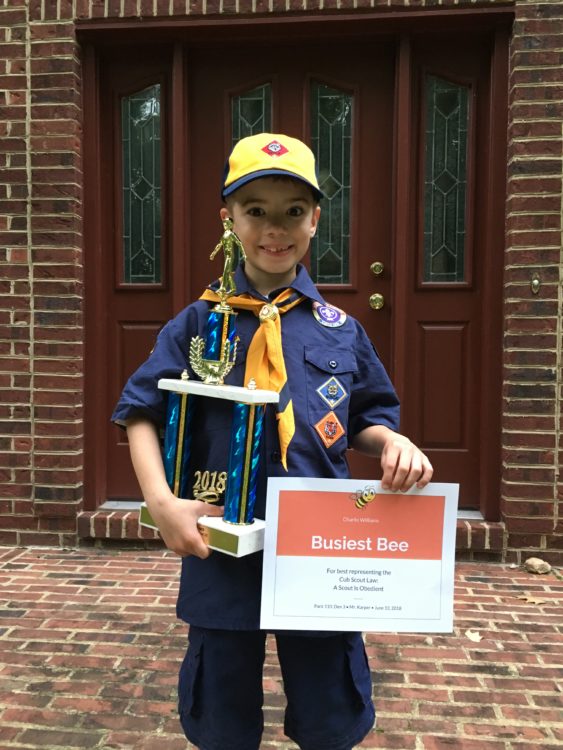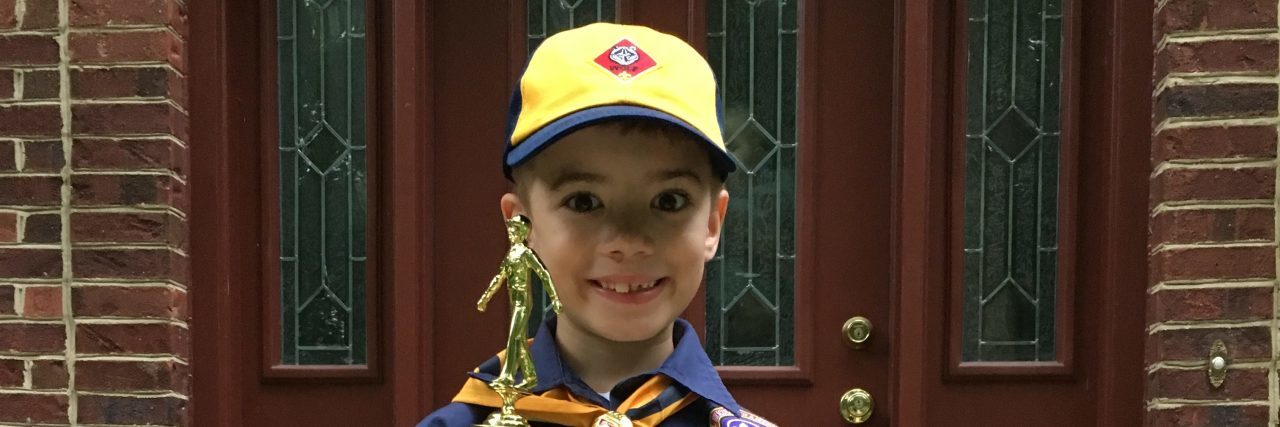10 Reasons Scouting Has Been Beneficial for My Son With a Disability
If you asked me four years ago, “Will you enroll your son in Cubs Scouts?” I would have responded with, “No way!” for selfish and misinformed reasons. Fortunately, I stepped out of my own comfort zone, and embraced the idea that scouting might be an excellent opportunity for my son with a nonverbal learning disorder (NVLD), and Cub Scouts just happened to be the most convenient scouting program to join in our area.
Children with NVLD tend to have difficulty recognizing and understanding abstract patterns — from nuances in social conversations, to moving their body in response to visual cues in competitive sports or “reading between the lines” in fictional text. By definition, verbal abilities are significantly stronger than nonverbal abilities, and this asymmetric development manifests itself in a way that can make socializing, visual-motor activities (sports, handwriting, etc.), abstract academics (reading comprehension, algebra, etc) and even some executive functioning skills seem impaired. I have read that some behaviors exhibited by a person with NVLD overlap with those with autism spectrum disorder (ASD) and attention deficit hyperactive disorder (ADHD), although the underlying causes differ. I have also read that, similar to other breeds of neurodiversity, NVLD occurs on a spectrum. Not every person with NVLD struggles in every potential area; nor is the degree of struggle equal across areas.
Needless to say, children with NVLD can benefit from therapies that address their difficulties. And as my husband conveniently pointed out, “life is therapy,” and by involving our son in a social activity he enjoyed, we were likely to see some growth in a structured yet authentic environment.
While I don’t claim to speak for all scouting programs or for all Cub Scout packs or dens, I can imagine many of our experiences extend to other scouting programs.
Here are the 10 reasons why we love scouting for our son with NVLD:
1. “Do your best” is the motto.
This means my son receives positive reinforcement and recognition for trying hard or making an attempt. As someone with black-and-white thinking, he can have difficulty seeing the value of effort and “process over product.” The consistent reminders and support to do his best provides a firsthand experience of a concept that is otherwise difficult to teach and learn.
2. Inclusiveness is part of the curriculum.
Many of the different age groups (dens) have explicit opportunities to learn about differences and how to value, empathize and be friendly toward persons with differences. Also, we are lucky to be part of a scouting group whose members happen to be very diverse, and inclusiveness is a core value. Similarly, scouting has progressed to honor all religions and our Pack has several agnostic or atheist scout families as well. I am also in favor of the recent inclusion of female cub scout participants. This change in policy creates teachable moments by sparking important conversations with young boys about gender equity.
3. The “curriculum” is a type of checklist.
People with NVLD tend to exhibit traits of anxiety, and one common coping mechanism for anxiety is to break down tasks or challenges into small, concrete, parts — like a checklist. This way, it’s a little less daunting to take a risk and leave your comfort zone; and you can come away feeling as though you accomplished something. The scout curriculum has multiple “adventures,” and within each adventure there are multiple smaller requirements. So while one of the goals may be to earn your rank badge at the end of the year, scouts and their leaders are given a guidebook with checklists and activities to break a year-long goal into manageable engaging activities.
4. Opportunities to take new risks.
Scouting helps us break out of routine, and away from our screens, and try things we might not have tried otherwise. And I’m not just talking about my child, but myself as a parent. It’s not always easy to come up with different activities that also have some therapeutic value. Instead, I can refer to the scout guidebook to try new things. An added benefit is how some new risks lead to new fascinations or appreciation of the world. For example, after volunteering to pick up trash around his school, my son expressed interest in doing it again. Further, he reflected on how pervasive the problem of littering is, and how we should encourage more people to help take care of the community alongside us.
5. Opportunities for quality family time.
Life is busy. It’s often hard to squeeze in that invaluable parent-and-child bonding time each day; the kind where you do whatever your child wants to do with you, even just for 10 minutes, because it builds their confidence and shows your love. Many scouting programs are designed to be family-oriented; parents and even siblings are encouraged to participate and support their scouts in working toward goals. There are so many activities and topics to choose from; the program provides a nice scaffold of opportunities where my son and I can find something mutually interesting to approach together.
6. Character development.
Scout programs are well known for fostering character development in young participants. The cub scout law encourages youngsters to be “trustworthy, loyal, helpful, friendly, courteous, kind, obedient, cheerful, thrifty, brave, clean and reverent.” Each of a scout’s adventures or activities can be explicitly tied to at least one of these 12 points, to help scouts learn and model positive character for themselves and others. In addition to providing a framework for practicing respect toward themselves, each other, their community and their environment, another key character development opportunity is confidence-building.
While the cub scouts program encourages family participation and support, part of a parent or guardian’s role is to guide scouts in attempting as many of the challenges on their own, to breed independence. For example, in preparation for the pinewood derby car race, a first-grader may not yet be using a saw to cut their pinewood block into an aerodynamic wedge, but they can draw their design, watch their adult-partner model tool safety, paint or decorate their car, and hammer in the wheels. Then by fourth or fifth grade, a scout may safely complete all steps of the process on their own (under adult supervision). In fact, one of the lessons for third-graders is to learn and practice safe use of tools, including a pocket knife. If my neurodiverse child is going to grow up in a world where he’ll eventually have access to, and a need for using sharp tools, I definitely prefer having the early, clear and accurate tutorial on safety to facilitate my parenting.
Scouting also promotes leadership through activities such as planning the Pack cookout and sharing speaking roles in public skits.
7. Awards, achievements, and trophies (when sports might not be your thing).
In a time where it seems like every other child we know is already playing travel sports, or getting private music lessons, or have otherwise found their talent — their “thing” — it’s nice to have a different route toward achievements, awards, and trophies that isn’t entirely based on fine or gross motor skills. Last year, my son won two trophies for the category of “most creative” in two completely different competitions: a cake-baking contest and the pinewood derby car race. Then he went on to win “most creative” in the cake-baking contest a second year in a row. And that’s something our whole family is celebrating.

8. It resembles a social skills group.
For children that struggle with pragmatic or nonverbal language or anxiety, small, semi-structured, authentic social groups can provide opportunities for skill development. Den meetings provide a natural small group environment where communication is important, yet circumstances are not too overwhelming. A group of four to eight scouts offers different personalities that facilitate social flexibility, opportunities for friendship, and bonding over similar interests. One of my hopes is that positive relationships established in the structure of the program persist when the scouts see each other in the school halls or playground; and so far, so good.
9. Opportunities to fail.
I have heard many parents express their child “needs more experience with losing.” Perhaps in part to my child’s highly sensitive personality, my near-sightedness as a new parent, and a culture of helicopter-parenting, my son’s experience working through a productive struggle is limited. Needless to say, it’s still difficult to take appropriate risks, fail and persevere. Scouting programs provide circumstances for youth to fail, come out on the other side, and grow as a result. Before my son won the trophies for his creativity, he experienced a first round elimination in a competitive boat race. Anything less than perfection can feel devastating when you have anxiety; failing in front of an audience of peers and parents is even worse. My son wanted to leave the event and questioned trying it in the first place. But then something amazing happened. The scout who won the heat came over to comfort my son. Shortly afterwards, my son was cheering-on that same scout as he progressed to the race finals. That is the kind of growth we celebrate.
10. It’s fun!
My son is stoked every time we have a scout day on the calendar. The activities are engaging and the company is great. Some of the activities we’ve enjoyed as a family, many of them new to us, include hiking, camping, visiting fire and police stations, launching Estes rockets, fishing derbies, bike derbies, Wreathes Across America ceremonies, environmental conservation projects, volunteer work at a horse rescue farm, marching in Memorial Day parades, interacting with STEM experts, adventurous summer camps, and the aforementioned boat races, car races and cake-baking contests.
My son ended his first year of scouting having earned every single belt loop for his Tiger tank. He went on to do the same for his second year as a Wolf. For that dedication he earned trophies, but more importantly, he shared a lot of new experiences and important conversations with his family. Now that we’re going into his third year, he has expressed the desire to earn all the belt loops for all years of Cub scouting to come.
It sounds like he has found something to take pride in. And we take pride in supporting him in however far he wants to venture!

